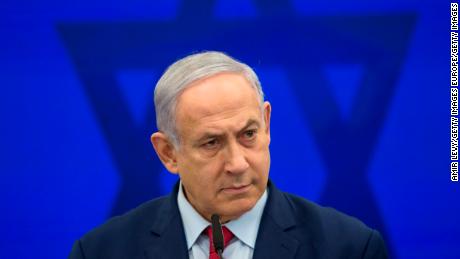Why no one in Israel seems able to win an election

Perhaps even less.And for the first time in a decade, there is a very real possibility that Benjamin Netanyahu will not be Israel's Prime Minister.Since 2009, Netanyahu has played Israeli politics like a fiddle, tuning it to his advantage. Only now the fiddle is broken.After he failed to secure a governing coalition in April's elections, Netanyahu triggered a do-over ballot instead of risking a different Prime Minister.Following a divisive three-month campaign in which he accused Arab citizens of Israel of stealing the vote, suggested his opponent was a weak leftist who may be mentally unstable, and complained of widespread election fraud, Netanyahu is now even further from forming a government than he was five months ago.To secure a coalition government, Netanyahu needs to ally his Likud Party with enough smaller parties to reach a total of at least 61 out of the Knesset's 120 seats. In April, he had 60. Hoping to pick up one more, Netanyahu legislated new elections. But his move has likely backfired — he now has only 55 seats."On the face of it, [Netanyahu] has gone from being the factor which has kept the right, and Likud, in power, to the single obstacle to them retaining power," says Jason Pearlman, former spokesman for Israel's President Reuven Rivlin. "That said, [Benny] Gantz's situation is no better."Benny Gantz, whose Blue and White Party leads Likud by two seats, may have a slightly larger bloc behind him, but even he has no clear path to a coalition. Combined with the Democratic Union, Labor and the Arab parties, Gantz would have just 57 seats, though it is not clear at the moment whether the Arab parties would definitely agree to join him.The kingmaker in these elections — former Defense Minister Avigdor Liberman and his eight-seat Yisrael Beiteinu Party — refuses to sit with the Arab parties or the ultra-Orthodox religious parties, meaning Gantz and Netanyahu are stuck. And so is Israel.
Unprecedented politics
Ostensibly, both leaders want a unity government between Likud and Blue and White, but Gantz has said he will not sit with Netanyahu while the Prime Minister is facing possible indictment in ongoing corruption probes.And Netanyahu, who called for negotiations to a unity government with no preconditions, was also quick to declare he had unified the ultra-Orthodox and religious Zionist parties behind him, which inherently imposes preconditions on any potential coalition negotiations."Everything that has taken place in the Israeli political system over the past year has been unprecedented," says Yohanan Plesner, the President of the Israel Democracy Institute. "We've never had a prime minister continue to serve once the attorney general decided to indict him (pending a hearing). We never had the head of a party lead his party to 'victory' in an election, receive the mandate from the president to form a government and then fail. And of course, we never had the Knesset disperse itself before a government was even formed.""We can only hope that our political leaders act responsibly and ensure that we don't head towards an unprecedented third election," Plesner added.Memes mocking the idea of a third election have become significantly less funny.President Rivlin, whose job it is to appoint the next political leader to form a government, promised he would do everything in his power to avoid another ballot, but there is little he can do to stop it if the Knesset votes to legislate a third election within one year — or if that election happens automatically.
What happens next?
There are now three political clocks ticking in Israel.The first — and loudest — is Netanyahu's legal clock. The Prime Minister faces potential indictment on corruption charges in three separate criminal investigations. His preliminary hearing is in less than two weeks, after which the Attorney General will make his final decision on indictment sometime later this year.Netanyahu has repeatedly denied any wrongdoing. His best defense against those charges may be that he is premier, so he will do everything he can to hold onto the position — a role he has held longer than any other Israeli leader. The second is the mechanism within the Knesset to trigger new elections. If neither Netanyahu, nor Gantz can form a government, the President can appoint another member of Knesset to try. If that fails, new elections are automatically triggered. Those elections would be sometime in late-March or early-April — one year after the first failed elections led to the mess in which Israel is currently mired.The third and final countdown is one within Netanyahu's own Likud party. As itRead More – Source
The second is the mechanism within the Knesset to trigger new elections. If neither Netanyahu, nor Gantz can form a government, the President can appoint another member of Knesset to try. If that fails, new elections are automatically triggered. Those elections would be sometime in late-March or early-April — one year after the first failed elections led to the mess in which Israel is currently mired.The third and final countdown is one within Netanyahu's own Likud party. As itRead More – Source




